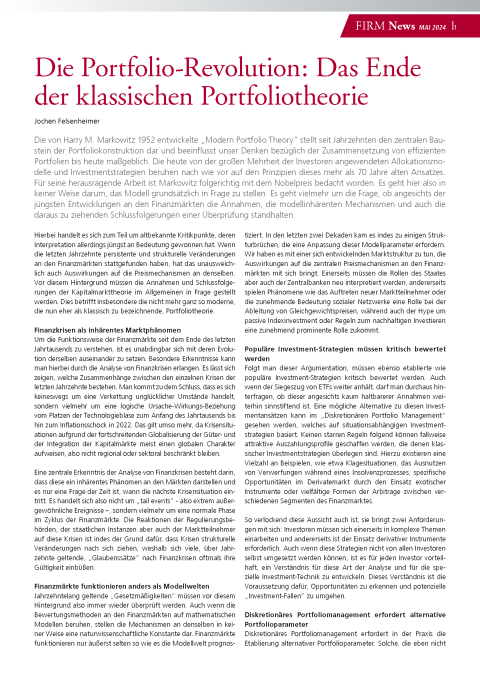Professional Articles
The end of classical portfolio theory
The current article deals with the question of whether the assumptions, the mechanisms inherent in the model and the conclusions to be drawn from them stand up to scrutiny in view of the latest developments on the financial markets.
Author: Dr. Jochen Felsenheimer, Managing Director of XAIA Investment GmbH
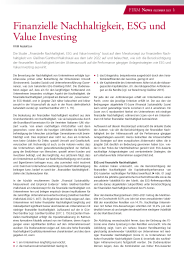
Financial sustainability, ESG and value investing
The current specialist article deals with the study “Financial sustainability, ESG and value investing”. It examines how the consideration of financial sustainability in stock selection affects the performance of common investment strategies such as ESG and value investing.
Authors: FIRM editorial team
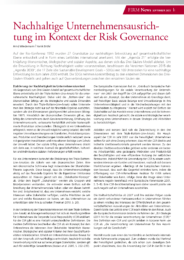
Sustainable corporate orientation in the context of risk governance
The concept of success, which used to be one-dimensional and focused only on economic performance, has changed to a three-dimensional concept of success that also reflects ecological and social success (triple bottom line).
Authors: Prof. Dr. Arnd Wiedemann and Yanik Bröhl
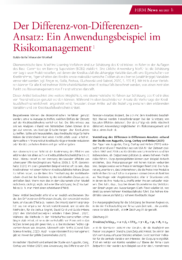
The Difference-of-Differences Approach: An Application Example in Risk Management
This article highlights the difference-in-differences approach as one way in which econometric techniques can be used to estimate the credit risk of financial institutions.
Authors: Dr. Guido Golla and Dr. Alexander Mosthaf
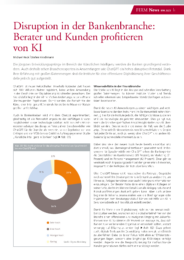
Disruption in the banking industry: advisors and customers benefit from AI
Recent leaps in development in the field of artificial intelligence will fundamentally change banks. Industry experts see high disruptive potential in applications like ChatGPT. The institutions are well positioned for a more aggressive digitization of their business models.
Authors: Michael Heck and Dr. Stefan Hirschmann
Professional Articles
The end of classical portfolio theory
The current article deals with the question of whether the assumptions, the mechanisms inherent in the model and the conclusions to be drawn from them stand up to scrutiny in view of the latest developments on the financial markets.
Author: Dr. Jochen Felsenheimer, Managing Director of XAIA Investment GmbH

Financial sustainability, ESG and value investing
The current specialist article deals with the study “Financial sustainability, ESG and value investing”. It examines how the consideration of financial sustainability in stock selection affects the performance of common investment strategies such as ESG and value investing.
Authors: FIRM editorial team

Sustainable corporate orientation in the context of risk governance
The concept of success, which used to be one-dimensional and focused only on economic performance, has changed to a three-dimensional concept of success that also reflects ecological and social success (triple bottom line).
Authors: Prof. Dr. Arnd Wiedemann and Yanik Bröhl

The Difference-of-Differences Approach: An Application Example in Risk Management
This article highlights the difference-in-differences approach as one way in which econometric techniques can be used to estimate the credit risk of financial institutions.
Authors: Dr. Guido Golla and Dr. Alexander Mosthaf

Disruption in the banking industry: advisors and customers benefit from AI
Recent leaps in development in the field of artificial intelligence will fundamentally change banks. Industry experts see high disruptive potential in applications like ChatGPT. The institutions are well positioned for a more aggressive digitization of their business models.
Authors: Michael Heck and Dr. Stefan Hirschmann
Professional Articles
The end of classical portfolio theory
The current article deals with the question of whether the assumptions, the mechanisms inherent in the model and the conclusions to be drawn from them stand up to scrutiny in view of the latest developments on the financial markets.
Author: Dr. Jochen Felsenheimer, Managing Director of XAIA Investment GmbH

Financial sustainability, ESG and value investing
The current specialist article deals with the study “Financial sustainability, ESG and value investing”. It examines how the consideration of financial sustainability in stock selection affects the performance of common investment strategies such as ESG and value investing.
Authors: FIRM editorial team

Sustainable corporate orientation in the context of risk governance
The concept of success, which used to be one-dimensional and focused only on economic performance, has changed to a three-dimensional concept of success that also reflects ecological and social success (triple bottom line).
Authors: Prof. Dr. Arnd Wiedemann and Yanik Bröhl

The Difference-of-Differences Approach: An Application Example in Risk Management
This article highlights the difference-in-differences approach as one way in which econometric techniques can be used to estimate the credit risk of financial institutions.
Authors: Dr. Guido Golla and Dr. Alexander Mosthaf

Disruption in the banking industry: advisors and customers benefit from AI
Recent leaps in development in the field of artificial intelligence will fundamentally change banks. Industry experts see high disruptive potential in applications like ChatGPT. The institutions are well positioned for a more aggressive digitization of their business models.
Authors: Michael Heck and Dr. Stefan Hirschmann

